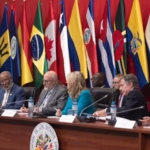Haiti’s Forum of Former Prime Ministers (FAPM) has issued a stark warning to the Transitional Presidential Council (CPT), cautioning against a “potential political catastrophe” on the horizon of February 7, 2026. The appeal was made public in a statement released on September 9, 2025.
The solemn warning, delivered with a sense of urgency, highlights the risk of an institutional vacuum if no measures are taken to ensure a legitimate transition. Yet the credibility of the call is immediately questioned by the backgrounds of its signatories, several of whom played roles in the very crisis they now denounce.
The FAPM paints a grim and realistic picture of Haiti’s situation, one shared by many observers. It points to the anticipated failure of the CPT to organize the constitutional referendum and general elections outlined in its “mandate.” The date of February 7, 2026—marking the theoretical end of the Council’s term—could, the group warns, open a period of paralysis and total anarchy, leaving the country without authorities possessing even minimal legitimacy.
The statement lists the ills plaguing Haiti: a “security chaos” paralyzing daily life, “economic and social asphyxiation,” “chronic political instability,” and mounting international isolation symbolized by the suspension of international flights and the closure of the border with the neighboring republic.
To avert this scenario, the Forum proposes applying Article 136 of the Constitution, which would allow the CPT to urgently convene an “inclusive national assembly.” This gathering, it argues, should bring together the “living forces of the Nation”: political parties, churches, the private sector, youth and women’s groups, civil society, and the diaspora, among others.
The stated objective is to craft a realistic agenda “by Haitians for Haiti” that could guide governance beyond February 2026, placing “the sovereign will of the Haitian people” at the center rather than relying solely on international solutions.
The Forum stresses that “Haiti’s future concerns Haitians first and foremost,” urging an end to “patterns of dependency.” It points to the “missteps of certain international decisions” and the repeated failure of peacekeeping missions to reverse the country’s decline.
This argument, while valid, also reads as a discreet mea culpa. Many of the former leaders now speaking out once governed under the influence or direct involvement of those same international actors they now criticize. Their appeal for self-determination thus carries the weight of an implicit acknowledgment of their past inability to break free from dependency and provide “clear and rational leadership” for the country.
Despite the heavy baggage of its members, the FAPM’s declaration remains a crucial alarm bell. It underscores that Haiti’s political class—even its most established figures—recognizes the abyss toward which the nation is heading.
The relevance of their proposal—a broad national consultation—cannot be dismissed. In a climate of widespread mistrust toward any authority, such an inclusive forum may represent the only viable path to rebuilding consensus and avoiding outright collapse.
The time for personal legitimacy battles has passed; the nation’s survival is at stake. February 7, 2026, is approaching quickly. And while the message comes from controversial voices, its content may prove vital to the future of all Haitians.








